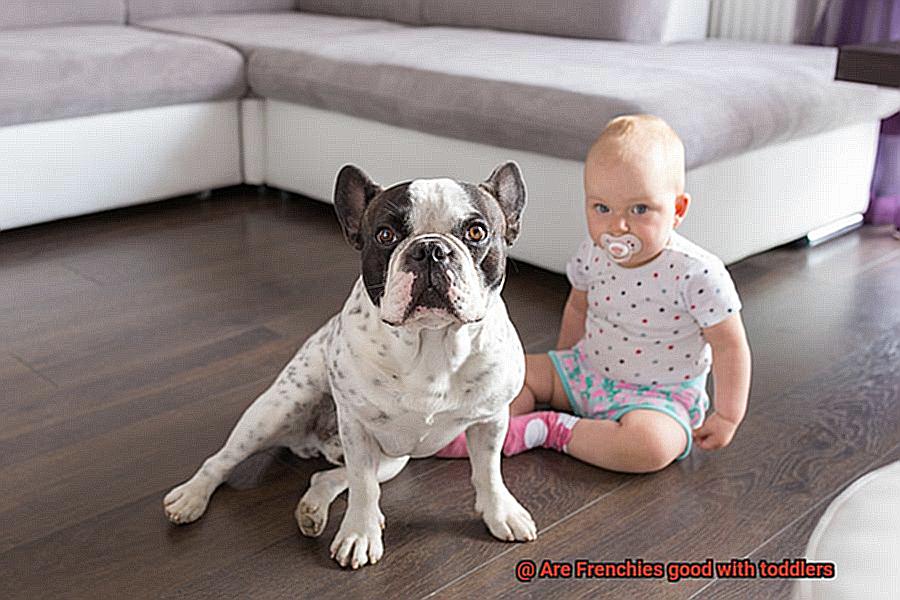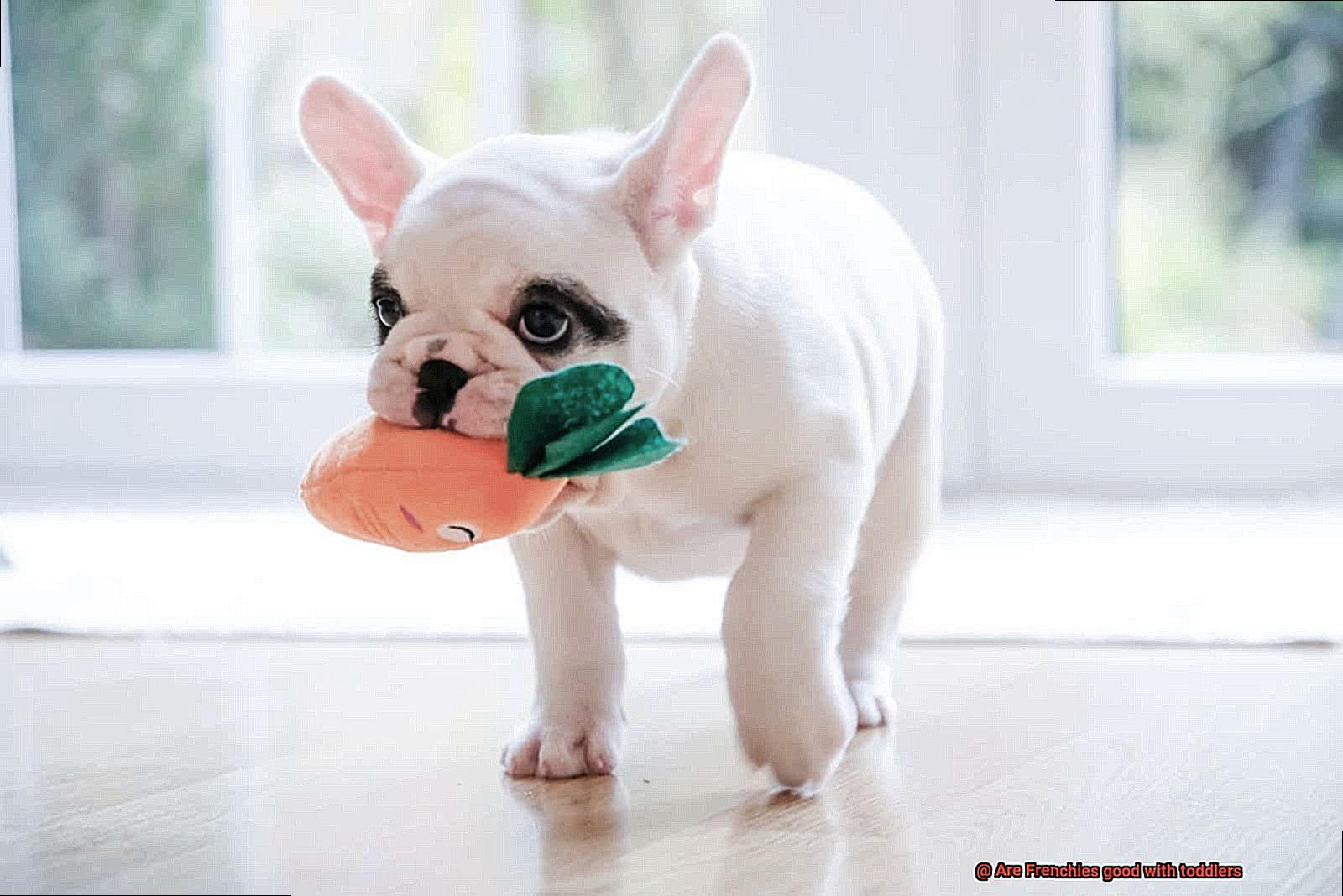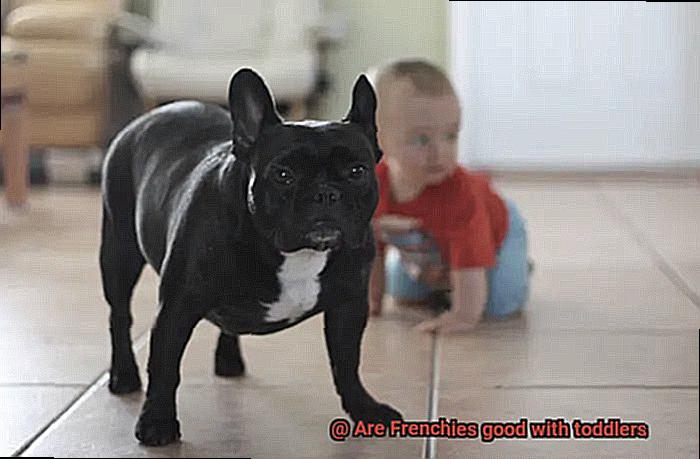Are Frenchies good with toddlers?
Picture this: a pint-sized ball of energy darting around your living room, giggles filling the air, while a lovable French Bulldog bounces alongside, tail wagging furiously. If you’re contemplating adding a furry friend to your family circus, the charming French Bulldog often steals the show.
But let’s cut to the chase – are Frenchies really good with toddlers? Get ready to dive into the enchanting world of French Bulldogs and their delightful interactions with young children.
French Bulldogs, or as we affectionately call them, Frenchies, are renowned for their irresistible charm and social nature. With their playful yet laid-back personalities, they forge unbreakable bonds with children, providing endless companionship and amusement. Their sturdy build and patient temperament make them an ideal match for households bustling with tiny tornadoes.
These gentle giants possess a knack for adapting seamlessly to the unpredictable nature of toddlers. Whether it’s a rambunctious game of tag or a cozy snuggle session on the couch, Frenchies effortlessly adjust to any energy level or peculiar quirk that little ones bring to the table. They become reliable playmates and fiercely loyal friends in no time.
But here’s where it gets even better: these four-legged wonders have an uncanny ability to read human emotions like mind-reading wizards. They can sense when a child needs comfort or simply craves an impromptu game of fetch. However, like any responsible pet owner knows, supervision is key when it comes to interactions between French Bulldogs and toddlers. Both parties need guidance on setting boundaries and handling each other respectfully – after all, harmony and safety reign supreme.
So yes, dear reader, French Bulldogs can indeed be an excellent choice for families with toddlers. Their friendly demeanor coupled with their adaptability makes them natural companions for little adventurers. Just remember that responsible pet ownership involves teaching both children and Frenchies how to coexist harmoniously. In our upcoming posts, we’ll delve deeper into the needs and characteristics of French Bulldogs, shedding more light on why they might be the perfect match for your family.
Stay tuned as we embark on a journey into the life of French Bulldogs and uncover just how well they click with our little ones. Trust us, it’s bound to be a tail-wagging adventure.
French Bulldogs: Gentle and Patient Temperament
Contents
- 1 French Bulldogs: Gentle and Patient Temperament
- 2 French Bulldogs’ Natural Instinct to Protect and Care for Family Members
- 3 Adaptability of French Bulldogs for Households with Toddlers
- 4 Individual Dog’s Behavior and Temperament Matter
- 5 Socialization and Training is Crucial
- 6 Supervision is Essential for Interactions between French Bulldogs and Toddlers
- 7 Teaching Both the Child and the Dog How to Interact Safely
- 8 Exercise and Mental Stimulation are Important for French Bulldogs
- 9 Conclusion
French Bulldogs, also known as Frenchies, are beloved for their gentle and patient temperament, making them an excellent choice for families with toddlers. These adorable pups have a natural instinct to protect and care for their loved ones, including young children. Let’s explore why French Bulldogs are the perfect companions for families with little ones.
Affectionate and Protective Nature
French Bulldogs are known for being affectionate and enjoy being around children. They form strong bonds with their owners and their families, making them patient and understanding when it comes to the unpredictable behaviors of toddlers. Their protective nature ensures that they watch over and are attentive to young children, earning them the title of “nanny dogs.”
Tolerant and Adaptable
Frenchies have a reputation for being tolerant and adaptable, making them well-suited to handle the energy and curiosity of toddlers. They can engage in gentle play with children, providing a great playmate for little ones who want a furry friend. Their calm and easygoing demeanor allows them to handle the excitement and chaos that often comes with having young children around.
Safety First
While French Bulldogs are generally good with toddlers, it is crucial to supervise interactions between them to ensure the safety of both parties. Toddlers may unintentionally hurt or startle the dog, so teaching them how to interact with the dog gently is essential. Close supervision ensures that any accidents are prevented, creating a harmonious environment for both the child and the dog.
Proper Socialization and Training
Proper socialization and training play a vital role in ensuring that French Bulldogs behave appropriately around toddlers. Early socialization exposes them to various situations, including interactions with children, helping them develop positive behaviors and reactions. Teaching basic obedience commands to the dog ensures they respond appropriately to the child’s actions.
Physical Considerations
French Bulldogs have a brachycephalic (short-nosed) structure, which may result in certain physical limitations. They may have difficulty breathing or regulating their body temperature, so providing them with a cool and comfortable environment is important, especially during hot weather or intense physical activities with toddlers.
French Bulldogs’ Natural Instinct to Protect and Care for Family Members
French Bulldogs, also known as Frenchies, are not only adorable and affectionate, but they also have a natural instinct to protect and care for their family members, including toddlers. If you have a Frenchie and a little one running around, you can rest easy knowing that your furry friend will be there to watch over and look after your child. Here’s why French Bulldogs are well-suited for family life with toddlers:
- Patient and Gentle Nature: Frenchies have a reputation for being patient and gentle dogs, which makes them ideal companions for young children. Toddlers can sometimes get a little rough during playtime or accidentally tug on their furry friend’s ears or tail. But fear not. French Bulldogs are known for their tolerance and adaptability, making them a great match for kids who may still be learning how to interact with animals.
- Protective Instinct: French Bulldogs have a strong protective instinct when it comes to their family members, especially children. They have a keen sense of awareness and will position themselves between any potential danger and their loved ones. This protective behavior provides an extra layer of security for parents, knowing that their Frenchie is always on guard to keep their little ones safe.
- Social and Loving Companions: French Bulldogs thrive on companionship and interaction with their human family members. They form strong bonds with everyone in the household, including toddlers. The sense of belonging they feel makes them even more inclined to protect and care for their younger family members.
But remember, while French Bulldogs may have these natural instincts, proper training and socialization are crucial. Early exposure to different environments, people, and situations will help your Frenchie become a well-rounded dog who is comfortable around children.
Adaptability of French Bulldogs for Households with Toddlers
French Bulldogs, with their adorable looks and friendly nature, can make wonderful additions to households with toddlers. Their adaptability and patient temperament make them well-suited for families with young children. Let’s explore why French Bulldogs can be a good fit for these households.

- Small Size and Sturdy Build: French Bulldogs are compact in size, which means they are less likely to accidentally knock over or injure a toddler compared to larger breeds. Their sturdy build also makes them more resilient to rough play, ensuring that both the Frenchie and the child stay safe during playtime.
- Patient and Tolerant: French Bulldogs are known for their patience and tolerance, which are crucial traits when living with young children who may not always know how to interact with dogs properly. They can handle the occasional ear pulling or tail tugging without reacting negatively, making them ideal companions for toddlers.
- Well-Socialized and Exposed to Children: When choosing a French Bulldog for your household with toddlers, it is important to select a dog that has been well-socialized and exposed to children from a young age. This exposure helps them become accustomed to the unpredictable behavior and noise that often comes with having toddlers around.
- Protective Nature: French Bulldogs have a natural protective instinct towards their family, including children. This protective nature can be reassuring for parents, knowing that their Frenchie will keep a watchful eye over their little ones. However, it is essential to differentiate between protectiveness and aggression. Any signs of aggression or discomfort should be addressed immediately with professional help.
- Proper Training and Supervision: To ensure the safety of both the Frenchie and the toddler, proper training and supervision are crucial. Teaching your toddler how to interact appropriately with dogs, such as not pulling on their ears or tail, is essential. Additionally, supervising their interactions and providing consistent training will help create a harmonious environment.

French Bulldogs can adapt well to households with toddlers and become loving and loyal companions for the entire family. However, it is important to remember that individual dogs can vary in temperament. Assessing the specific Frenchie’s behavior and personality is crucial before introducing them to a household with toddlers.
With the right socialization, training, and supervision, French Bulldogs can bring joy and happiness to households with young children.
Individual Dog’s Behavior and Temperament Matter
French Bulldogs are often considered excellent companions for families with toddlers. Their friendly and patient nature, combined with their small size, make them an ideal playmate for little ones. However, it is essential to remember that each Frenchie has its own unique behavior and temperament. In this article, we will explore why considering these individual traits is crucial when assessing their compatibility with toddlers.
Evaluating Temperament:
- Understanding a Frenchie’s overall personality traits is vital in determining how they may react to toddlers.
- Some Frenchies may be naturally calm, patient, and gentle, making them well-suited for interacting with young children.
- Others may have more excitable or high-energy behaviors, which might not be as suitable for households with toddlers.
Past Experiences and Socialization:
- Proper socialization from a young age plays a significant role in a Frenchie’s comfort level around different people, including children.
- Dogs that have positive associations with children are more likely to interact appropriately and be at ease around toddlers.
- Limited exposure to children or negative experiences can lead to anxiety or uncertainty in French Bulldogs when interacting with toddlers.

Tolerance for Handling and Physical Contact:
- Toddlers can be unintentionally rough or clumsy in their interactions with dogs.
- A Frenchie with a higher tolerance for physical contact may be more forgiving of accidental mishaps.
- Dogs with lower tolerance may become stressed or reactive in such situations.
Possessive Behaviors:
- While French Bulldogs are generally friendly and sociable, some individuals may display possessive behaviors over toys or food.
- These behaviors could potentially lead to conflicts with toddlers who unknowingly encroach upon the Frenchie’s personal space.
- Close observation and monitoring of interactions are crucial to ensure the safety of both the Frenchie and the child.

Socialization and Training is Crucial
French Bulldogs are known for their affectionate and friendly nature, making them wonderful companions for families with young children. However, to ensure a harmonious relationship between your Frenchie and your little one, socialization and training are key. In this section, we will explore why socialization and training are essential for French Bulldogs when interacting with toddlers.
Why Socialization Matters:
Socialization is the process of exposing your Frenchie to various people, animals, environments, and situations from a young age. It helps them develop positive behaviors and reduces the likelihood of fear or aggression towards unfamiliar things. By socializing your French Bulldog with toddlers early on, preferably during their puppyhood, you help them become familiar with the sights, sounds, and movements of young children.
Tips for Socializing French Bulldogs with Toddlers:
Introduce your Frenchie to toddlers in a controlled and positive manner. Start with short, supervised interactions to ensure the safety of both the dog and the child.
Teach your Frenchie basic obedience commands such as sit, stay, and leave it. These commands will come in handy when managing their behavior around toddlers.
Use positive reinforcement training methods to reward good behavior with treats or praise. This encourages your Frenchie to repeat those behaviors.
Gradually expose your Frenchie to various stimuli associated with toddlers, such as their toys or high-pitched voices. This desensitization technique helps them become more comfortable and less reactive in those situations.
Consistency is key when training French Bulldogs. Establish a routine and stick to it. This helps them understand what is expected of them and reduces confusion or anxiety.
The Importance of Supervision:
While French Bulldogs can generally be good with toddlers, it’s crucial to remember that each dog is an individual. Some may naturally have a higher tolerance for children, while others may require more training and socialization. Always monitor interactions between your Frenchie and toddlers closely, and never leave them unsupervised.
Consulting with Professionals:
If you’re unsure about how your Frenchie will behave around toddlers, don’t hesitate to consult with a professional dog trainer or behaviorist. They can provide guidance and help you create a training plan tailored to your specific situation.
Supervision is Essential for Interactions between French Bulldogs and Toddlers
French Bulldogs can make wonderful companions for young children, but it’s important to remember that supervision is essential to ensure the safety and well-being of both the dog and the toddler. In this article, we will explore why supervision is crucial for interactions between French Bulldogs and toddlers and provide practical tips for creating a harmonious relationship.
Understanding Boundaries
Toddlers are still learning how to interact with animals and may not understand the concept of boundaries or how to treat a dog gently. Supervision allows parents to closely monitor these interactions and intervene if necessary. This helps prevent any potential harm or discomfort to either party.
Recognizing Stress and Overwhelm
French Bulldogs are generally patient and tolerant, but they can become overwhelmed or stressed if a toddler tries to pull their ears, tail, or fur. By actively supervising interactions, parents can quickly identify signs of stress such as growling, lip licking, or attempts to move away. Immediate intervention can then take place to diffuse the situation.
Teaching Proper Approach and Touch
Supervision provides an opportunity to teach toddlers how to properly approach and touch a dog. This includes gentle petting, avoiding sensitive areas, and always asking for permission before touching the dog. By teaching these skills early on, parents can help establish a positive and respectful relationship between the child and the dog.
Basic Obedience Commands
Supervision should also involve teaching the French Bulldog basic obedience commands such as “sit,” “stay,” and “leave it.” These commands can help redirect the dog’s attention or prevent them from engaging in undesirable behaviors around toddlers. This adds an additional layer of safety during interactions.
Monitoring Behavior
Supervision goes beyond just physical interactions. It is crucial to monitor the child’s behavior towards the dog as well. Rough play, pulling on body parts, or teasing should never be tolerated and should be addressed immediately.
Teaching Both the Child and the Dog How to Interact Safely
Teaching a child and a French bulldog how to interact safely is crucial for fostering a harmonious relationship between them. By educating both parties on proper behavior and boundaries, we can create a safe and enjoyable environment for everyone involved. In this guide, we’ll explore effective strategies to teach both the child and the dog how to interact safely.
Educating the Child:
- Teach basic dog behavior and body language: Explain that dogs have boundaries and need their personal space respected. Discourage pulling on ears or tails, or poking, as it can cause discomfort.
- Encourage calm and gentle approach: Teach the child to approach the dog calmly, using soft voices and slow movements. Sudden gestures or loud noises may startle the dog.
- Supervision is key: Always supervise interactions between the child and the dog, especially during the initial stages of their relationship. This allows for intervention if any inappropriate behavior occurs.
Teaching the Dog:
- Obedience training: Implement obedience training to teach basic commands such as “sit,” “stay,” and “leave it.” These commands can redirect the dog’s attention away from potential dangers or inappropriate behavior around the child.
- Socialization with children: Gradually expose the dog to children of different ages, helping them become comfortable in their presence. Introduce scenarios like being touched or hugged by a child, promoting calm reactions.
- Positive reinforcement: Reward good behavior with treats or praise to reinforce positive interactions between the dog and the child. This encourages a positive association and strengthens their bond.
Providing Safe Spaces:
- Designated spaces: Ensure both the child and the dog have safe spaces they can retreat to when they need alone time. This could be a designated area for the dog or a playpen for the child.
- Time to recharge: It’s essential for both parties to have their own space and time to relax and recharge, promoting a healthy relationship.
Exercise and Mental Stimulation are Important for French Bulldogs

Today, we’re going to uncover the secrets to creating a purrfect bond between French Bulldogs and toddlers. We’ve already covered behavior, boundaries, and training, but now it’s time to get those paws moving and those brains buzzing. That’s right, we’re talking about exercise and mental stimulation. Let’s dig in.
Exercise and Mental Stimulation for a Tail-Wagging Time.
The Power of Pawsitive Energy:
- Regular exercise helps French Bulldogs burn off excess energy, preventing them from bouncing off the walls when toddlers are around.
- Physical activity keeps our furry friends fit as a fiddle, guarding against obesity and related health issues. Let’s keep those zoomies in check.
Playful Playtime:

- Daily walks with your Frenchie and toddler not only give the pup physical exercise but also provide mental stimulation for both.
- Outdoor adventures help your little one explore nature while your furry buddy sniffs out new smells – it’s a win-win.
Brain-Boosting Games:
- French Bulldogs are intelligent pups who thrive on mental challenges. Engage them in interactive games like fetch or hide-and-seek.
- These activities keep their minds sharp as a tack, preventing boredom from creeping in.
Age-Appropriate Activities:
- Remember, puppies and toddlers have different energy levels and stamina. Adapt activities accordingly to avoid overtiring either party.
- Consult a veterinarian or dog trainer to determine how much exercise is pawfect for your Frenchie and your little rugrat.
Mental Gymnastics:
- Mental stimulation is just as impawtant as physical exercise. Introduce puzzle toys or treat-dispensing toys to keep your Frenchie’s mind active.
- Training sessions that challenge their problem-solving skills are like a mental workout – flex those brain muscles.
AoM6KsH9y9w” >
Conclusion
In conclusion, French Bulldogs can be wonderful companions for toddlers.
Their gentle nature and affectionate disposition make them a great choice for families with young children. With proper training and socialization, Frenchies can form strong bonds with kids and become their loyal protectors.
They are patient and tolerant, often putting up with the unpredictable behavior of toddlers without getting agitated. French Bulldogs also have a playful side that matches well with the energy levels of young children.
It is crucial to supervise interactions between Frenchies and toddlers to ensure the safety of both parties.




